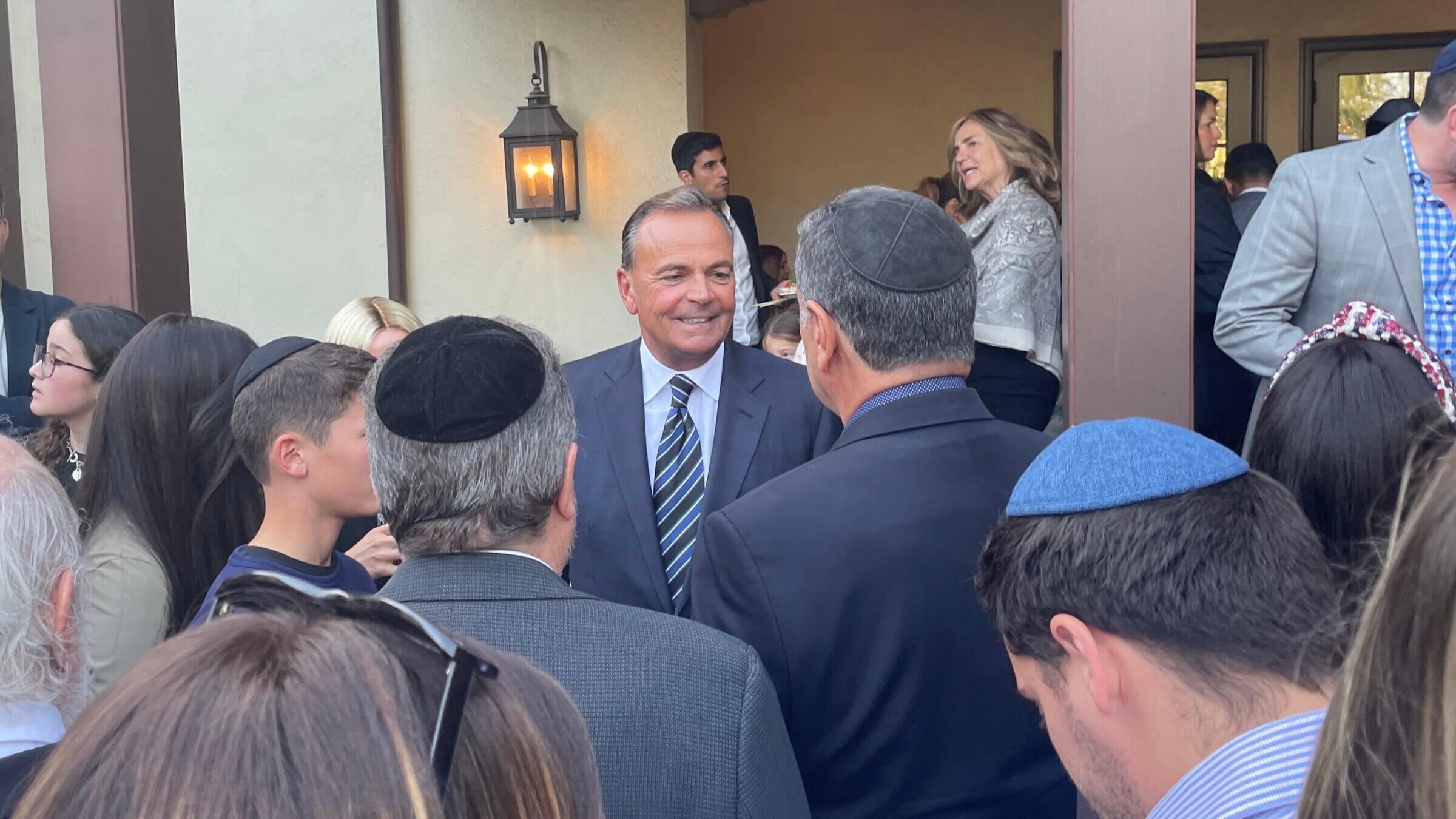In LA, like New York, one candidate has courted the Orthodox community. Will it lift him to victory?
Hard-line positions on homelessness, law enforcement and Israel have made Rick Caruso lawn signs ubiquitous in Orthodox neighborhoods

Rick Caruso at a private event in Hancock Park on May 24. Photo by Louis Keene
When U.S. Rep. Karen Bass took the stage at a mayoral candidate forum hosted in October by the Jewish Federation of Los Angeles, she brought with her a swath of endorsements from the Jewish liberal establishment — more than 100 politicians, clergy and community leaders.
Then it was Rick Caruso’s turn, the shopping-mall magnate who has run to Bass’ right. (Both are registered Democrats.) He brought up a segment of the Jewish electorate that has been in his corner since the primary — and which his opponent had, that evening, neglected to mention at all.
“We have to have more officers being visible, particularly in the Jewish neighborhoods — in the Orthodox neighborhoods — giving safe passage to worship,” Caruso said. “We’re not doing that now.”
After Orthodox Jews favored Donald Trump in the last two presidential elections, the political divide between Orthodox and non-Orthodox American Jews has come into increasing focus. And like the governor’s race in New York, in which a significant Orthodox bloc has rallied behind Republican Rep. Lee Zeldin while the non-Orthodox have put their strength behind incumbent Democrat Gov. Kathy Hochul, Tuesday’s mayoral election in Los Angeles — which began with Bass heavily favored, but some polls now say is too close to predict — could tilt in part on how the Orthodox community votes.
On Monday, Los Angeles Jewish leaders cautioned against reading too much into the apparent similarities between the two races, saying that the issues galvanizing Orthodox voters in New York and Los Angeles are fundamentally different.
Caruso has attracted Orthodox voters through hard-line stances on homelessness and law enforcement, said Dr. Irving Lebovics, chairman of Agudath Israel of California, a Haredi umbrella organization.
And while those issues have popped up in New York’s gubernatorial race, the Orthodox attachment to Zeldin has much more to do with his opposition to attempts to regulate Yeshiva education.
Yet, like Zeldin, Caruso has made Orthodox voters a notable focus of his campaign. In the run-up to the June primary that sent him and Bass into the current runoff election, he held a question-and-answer session at the home of Warner Bros. executive Steve Spira, who is Orthodox — an event that included an evening prayer service.
And he has nurtured relationships with Orthodox rabbis like Zushe Cunin of Palisades Chabad, who said Caruso once gave the synagogue free space to use at Palisades Village, one of his shopping malls.
Lebovics has personally endorsed Bass, saying she earned his trust through her work on issues of religious freedom during her four-year stint as an assemblywoman before her election to Congress in 2010.
But, Lebovics said, the “vast majority” of the Haredi Orthodox community his organization represents is in Caruso’s camp. (Agudath Israel has not endorsed a candidate in the race.)
“A lot of them are voting based on the caricature of a conservative candidate against a liberal candidate,” he said.
Another major policy issue behind Orthodox support for Caruso, Lebovics added, is that of Israel — an issue that has popped up in the New York race, but without nearly so much contention. Many Orthodox voters, he explained, are skeptical of Bass’ support of Israel because of her support for the Iran Nuclear Agreement, which she voted to ratify in 2015.
While Bass has visited Israel three times as an elected official and voted to increase U.S. funding for the Iron Dome in 2021, Lebovics said, she has yet to dispel concerns among Orthodox voters over her approach to the Jewish state.
Bass’ vote for the Iran deal may have factored into the right-leaning Israeli-American Civic Action Network’s endorsement of Caruso, and still rankles among some Orthodox rabbis in LA.
Meanwhile, Caruso has been fulsome in his praise of the Jewish state, recently telling the Jewish Journal, “I’ve fallen in love with the state of Israel.”
Pro-Israel voters have a long memory, said Raphael Sonenshein, a veteran of Los Angeles political demography who is the director of the Pat Brown Institute of Public Affairs at California State University Los Angeles.
Sonenshein pointed out that the vast majority of Los Angeles’ Jewish voters are still liberal, and tend to turn out at higher rates than other demographic groups. But in the Orthodox community, Israel can dominate the election conversation — yes, even in elections that seemingly have little to do with a country some 8,000 miles away.
“Israel is really a defining voting issue for Orthodox Jewish voters, probably to the exclusion of a number of other issues,” Sonenshein said.
Lebovics cautioned against describing Orthodox voters as a monolith, pointing to his own endorsement of Bass. And endorsements from the Haredi world in New York have been far from unified: Leaders of one Satmar Hasidic sect have touted Gov. Kathy Hochul.
But in a race that seems to be growing closer by the day, a high Orthodox turnout — roughly 10% of the city’s Jewish population of about 530,000 — could be critical in helping Caruso to an upset victory, although no one is calling the Los Angeles Hasidic community “a political force” quite yet.
Ultimately, on both coasts, the growing political significance of the Orthodox community comes down to one thing, Lebovics said. “I think our people vote, and we get a little bit disproportionately represented in that regard. Because many other people just don’t vote.”






















